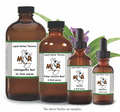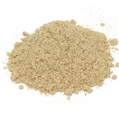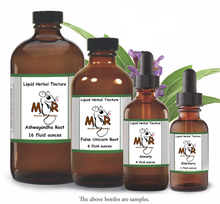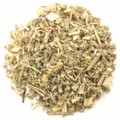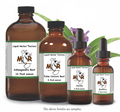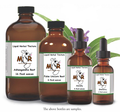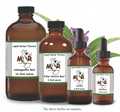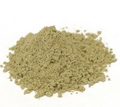 Loading... Please wait...
Loading... Please wait...- Home
- Herbal Tinctures
- Herbal Tinctures - Single Herbs
- Wormwood Herb Tincture
Wormwood Herb Tincture
Product Description
Wormwood Herbal Tincture
Wormwood, a nervine tonic, it nourishes the nervous system easing stress and nervous disorders. When used as an herbal tranquilizer, it helps calm and soothe the nerves and reduces tension and anxiety. The herb's absinthin content is a narcotic analgesic that affects the medullary portion of the brain concerned with anxiety and is said to induce a relaxed state. It is also said to be helpful for liver and gallbladder secretions. Soothes gastric pain and stomach acidity. Also helps with fevers, colds, jaundice, circulation and rheumatism.
Wormwood has also been used medicinally as a mild sedative that affects the portion of the brain dealing with pain aiding in the relief of migraine headaches, nervous diseases and is very soothing for nervous temperament.
Wormwood tea has been recommended to help relieve the pain of labor. When applied externally to the skin it relieves the pain of sprains, bruises and irritations of the skin. It acts as a local anesthetic when applied to relieve pains of rheumatism, neuralgia and arthritis.
Wormwood has been used as a powerful tool to fight worms, most notably, eliminate pin-worms and roundworms and other parasitic infestations in humans and animals. It has long been used as an anthelmintic that expels intestinal worms and research has indicated that because of the increasing resistance to parasites, the compounds contained in this herb are now relied on greatly to treat malaria. It has been used to treat migraines headaches and as a digestive that improves the appetite and relieves digestive disturbances. When applied topically it aids in healing wounds, blemishes, skin ulcers and insect bites.
Wormwood aids in secretions of the gallbladder and liver and is an old and trusted remedy for biliousness and liver troubles, jaundice and gallbladder ailments.
Wormwood is a cardiac stimulant and therefore acts, when taken in the proper dosage, to improve circulation.
Traditionally, herbalists claim that Wormwood lowers intermittent fevers and fights infection. Because it increases stomach acidity, it aids in the whole digestive process. It has been used to help alleviate gastritis, stomachache, bloating and flatulence. As a bitter, aromatic herb, Wormwood is also said to improve a poor appetite.
Wormwood has been effective as a uterine stimulant that is said to help regulate irregular menstrual cycles (this herb should not be used by pregnant women).
Applied topically, the oil extracted from Wormwood acts as an anti-inflammatory that is used as a liniment to relieve pain and sore muscles. It is useful for healing wounds, skin ulcers, blemishes and insect bites. Wormwood may also be used as an organic insect repellent when sprayed on organic gardens or when prepared as a sachet to keep moths from clothing.
Ingredients: Fresh Wormwood and certified grain alcohol. 1:3 Ratio
Suggested: Use 6-12 drops in juice, water, under the tongue or as desired. May be taken 3 times daily. Shake well. Store in cool dark place. Keep out of reach of children.
Precautions: Wormwood should not be used by nursing mothers nor taken during pregnancy, as it is a uterine stimulant and can cause spontaneous abortion. Do not overuse; it may be habit forming with long-term use, and prolonged use may cause nausea, vertigo and insomnia. Wormwood can be a strong poison, and any excessive use can cause poisoning, but with proper dosage there is little or no danger. Wormwood should never be given to children. Do not use Wormwood if you are taking Phenobarbital.
Disclaimer: The information presented herein by Mountain Maus Remedies is intended for educational purposes only. These statements have not been evaluated by the FDA and are not intended to diagnose, cure, treat or prevent disease. Individual results may vary, and before using any supplements, it is always advisable to consult with your own health care provider.







